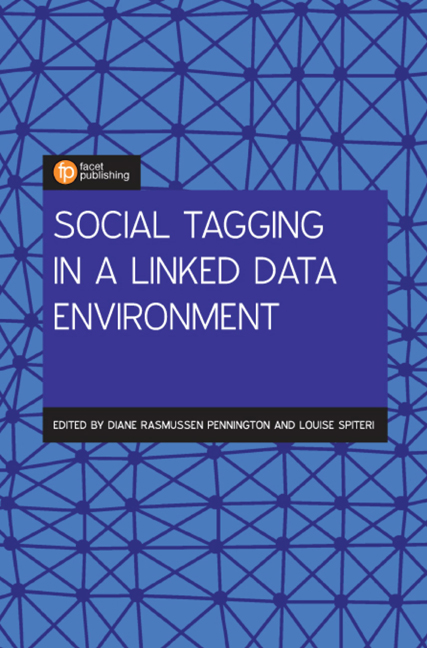Book contents
- Frontmatter
- Contents
- List of figures and tables
- Contributors
- 1 Introduction: the continuing evolution of social tagging
- 2 Tagging the semantic web: combining Web 2.0 and Web 3.0
- 3 Social tags for linked data with Resource Description Framework (RDF)
- 4 Social tagging and public policy
- 5 Hashtags and library discovery systems
- 6 Social information discoverability in Facebook groups: the need for linked data strategies
- 7 #FandomCommunication: how online fandom utilises tagging and folksonomy
- 8 Keys to their own voices: social tags for a dementia ontology as a human right
- 9 Social tagging and the enterprise: an analysis of social tagging in the workplace
- 10 Use and effectiveness of social tagging recommender systems
- Index
6 - Social information discoverability in Facebook groups: the need for linked data strategies
Published online by Cambridge University Press: 01 June 2019
- Frontmatter
- Contents
- List of figures and tables
- Contributors
- 1 Introduction: the continuing evolution of social tagging
- 2 Tagging the semantic web: combining Web 2.0 and Web 3.0
- 3 Social tags for linked data with Resource Description Framework (RDF)
- 4 Social tagging and public policy
- 5 Hashtags and library discovery systems
- 6 Social information discoverability in Facebook groups: the need for linked data strategies
- 7 #FandomCommunication: how online fandom utilises tagging and folksonomy
- 8 Keys to their own voices: social tags for a dementia ontology as a human right
- 9 Social tagging and the enterprise: an analysis of social tagging in the workplace
- 10 Use and effectiveness of social tagging recommender systems
- Index
Summary
Information discoverability in Facebook groups
The progression of the web from a source of static information to a forum for dynamic, socially engaged, user-generated content has engendered a milieu of interaction and immediacy related to communication and information seeking. Popular online social networks (OSN) such as Twitter, Facebook, Snapchat and Instagram allow users to communicate and generate content for commun - ication, entertainment and information seeking and sharing. Users as well as visionary developers have helped define these socially driven web tools as constructive and user-friendly.
Since its inception over a decade ago, Facebook has evolved from a communication channel exclusively for Harvard students to a worldwide forum for shared experiences in specialised groups. As Weinberger (2017) noted in Business Insider on 7 September 2017, Mark Zuckerberg, as a student at Harvard in 2004, created Facebook to allow students to discover information about other students. By ‘friending’ another student, one could discover information such as his or her class enrolment and community connections. In viral fashion, more than half of the Harvard student community joined Facebook within a month. Just two months later, students at other academic institutions such as Yale, Columbia and Stanford joined in, launching a global tech company that is now a powerful player in OSN communication and information sharing.
On 3 May 2017 – over a decade later – in a public post to the Facebook (FB) community summarising the 2017 first quarter business report, Zuckerberg, the influential FB founder, announced the company's intent to focus on building community among its more than 1.9 billion users. FB data indicates that over 100 million of its users are members of specialised community groups that have formed around significant issues, interests and concerns, such as parental support, specific illnesses and political and activist movements. Zuckerberg (2017b) described these groups as very meaningful and as an important piece of the lives of people engaged in these communities. In another public FB post – Building Global Community – on 16 February 2017, Zuckerberg (2017a) spoke openly regarding both humanitarian and political influences of Facebook to positively impact the human condition. In turn, he and Facebook have also become outspoken supporters of hot topics such as marriage equality, equal rights and other political and social justice issues.
- Type
- Chapter
- Information
- Social Tagging for Linking Data Across Environments , pp. 109 - 130Publisher: FacetPrint publication year: 2018



